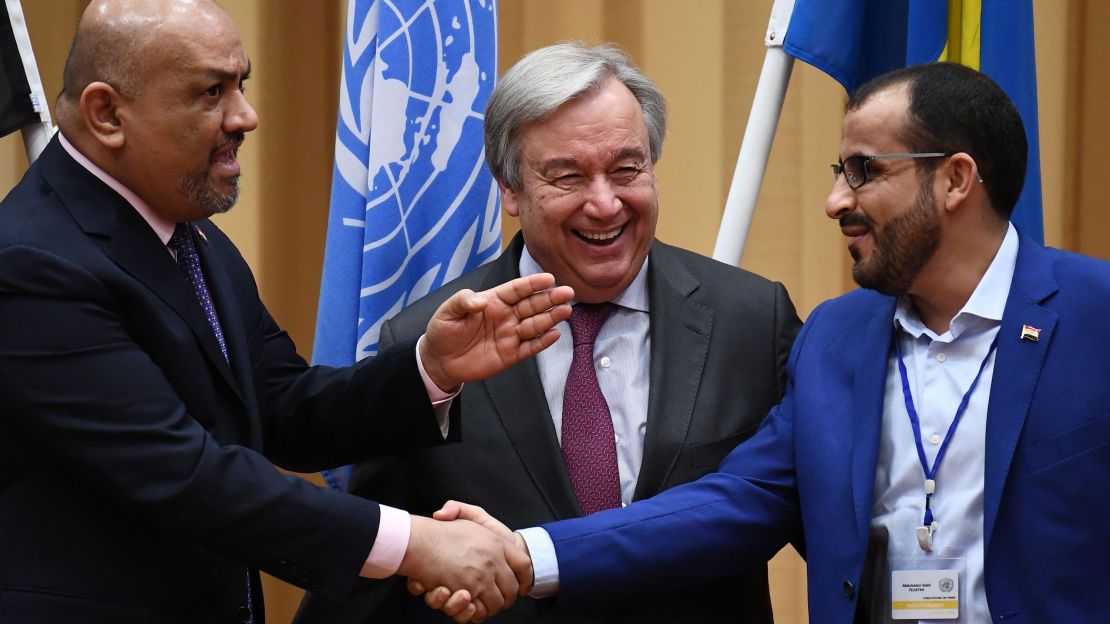Yemen’s warring parties have agreed to a ceasefire in Hodeidah, a major flashpoint in the country’s war, UN Secretary-General Antonio Guterres said Thursday.
The besieged rebel-held port city is an entry point for 70% of foreign humanitarian aid into the country, according to the United Nations, which has described Hodeidah as a “lifeline” for Yemen’s war-ravaged population.
“We have reached an agreement on Hodeidah port and city which will see a mutual redeployment of forces from the port and the city and an establishment of governorate-wide ceasefire,” Guterres said. “UN will play a leading role in the port, and this will facilitate humanitarian access.”

The ceasefire announcement came at the conclusion of the first direct talks in more than two years between representatives of Yemen’s internationally recognized government, which Saudi Arabia supports, and the Iranian-backed Houthi rebels.
International pressure has intensified for a ceasefire as the humanitarian crisis worsens in Yemen after more than three years of war.
The warring parties, which have been meeting in Sweden for the past week, also agreed to a large-scale prisoner exchange and to de-escalating violence around Taiz, where intense battles have raged between the Saudi-backed forces and Houthi rebels.
“We’ve also reached a mutual understanding to ease the situation in Taiz, and I believe this will lead to the opening of humanitarian corridors and facilitation of demining,” Guterres said.
As the talks ended Thursday, both sides shook hands as shouts of “congratulations” rang out in the background. The two are set to meet again at the end of January, according to the UN chief.
Until then, negotiations are expected to continue, including over a key Houthi demand to open Sanaa’s airport to commercial flights. Martin Griffiths, the UN special envoy to Yemen, told reporters that an agreement on the Yemeni capital’s airport could be reached within a week.
Sanaa International Airport is held by Houthi rebels, but Saudi Arabia, which imposes an air blockade over Houthi-held areas, only allows UN flights into the capital.
“We don’t have to be here to get an agreement,” Griffiths said from Rimbo, north of Stockholm. “We’re going to keep on negotiating. Sweden will continue without Sweden.”
Guterres didn’t specify when the Hodeidah ceasefire is expected to go into effect but said the United Nations will take on an “important monitoring role” in the port, a major rebel gateway into the Red Sea.
“Based on your constructive engagement in Sweden, we have a better understanding of the positions of the parties,” Guterres told the rival delegations.
“We have agreed to engage in the discussions on a negotiating framework in the next meeting. This is a critical element for the future of political settlement to end the conflict.”
The last Yemen peace talks in 2016 ended with Houthi rebels rejecting a UN proposal, prompting the Saudi-backed Yemeni officials to leave the talks.
Twenty million people in Yemen are hungry, with 1.8 million children “acutely malnourished,” according to a report released Thursday by the Yemeni government, the UN Food and Agriculture Organization, UNICEF, the World Food Programme and humanitarian partners.
The Yemen conflict began after Houthi rebels took over Sanaa in August 2014 and escalated following a Saudi and Emirati-led intervention in March 2015.
The war has claimed more than 10,000 lives and sparked what the United Nations has called “the world’s worst humanitarian crisis.” The country is also home to the world’s worst famine in 100 years, the United Nations says.

